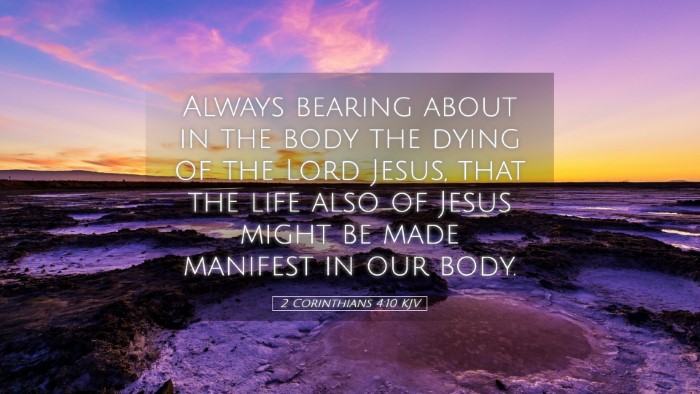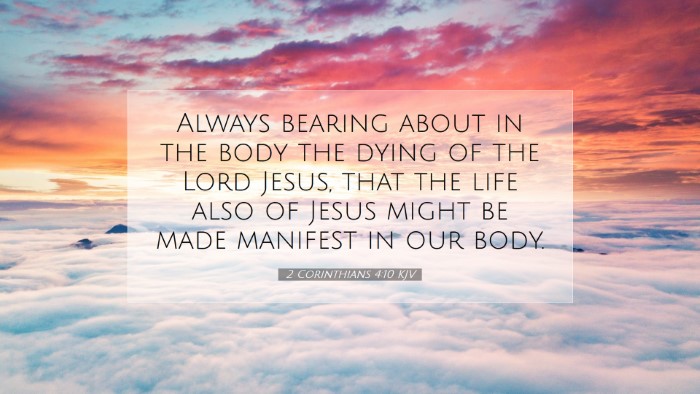Commentary on 2 Corinthians 4:10
2 Corinthians 4:10 states: "Always carrying about in the body the dying of the Lord Jesus, that the life also of Jesus might be made manifest in our body." This verse encapsulates the apostle Paul's profound reflection on suffering, sacrifice, and the manifestation of Christ's life within believers. Below is a synthesized commentary combining insights from prominent public domain commentators.
Contextual Background
This verse is situated in Paul’s second letter to the Corinthians, where he addresses issues of suffering, divine comfort, and the nature of his ministry. The backdrop of this epistle includes both external pressures from adversarial critics and internal challenges within the Corinthian church. Paul seeks to establish his apostolic authority while highlighting the paradox of Christian suffering that leads to divine revelation.
Thematic Insights
-
The Dying of the Lord Jesus:
Paul emphasizes the reality of suffering that mirrors Christ’s passion. Matthew Henry notes that this 'dying' is not only physical but encompasses emotional and spiritual struggles. Paul’s life exemplifies a continuous bearing of the cross, showcasing the necessity of identifying with Christ’s sufferings (Philippians 3:10).
-
A Manifestation of Life:
Albert Barnes highlights the dual nature of suffering and life. It is through the acknowledgment of death to self and worldly ambitions that believers experience the vivifying power of Christ’s resurrection. The phrase "that the life also of Jesus might be made manifest" signifies the transformative effect that trials can have when approached with faith.
-
Union with Christ:
Adam Clarke emphasizes that the suffering believer shares in the life of Jesus. These sufferings are not in vain; rather, they are integral to the Christian journey whereby believers not only partake in Christ’s sufferings but also in His glory (Romans 8:17). Clarke asserts that this union is an essential truth of Christian doctrine.
Theological Reflections
Paul’s teaching here addresses both theological and practical dimensions of faith. The suffering of believers is not a sign of God’s abandonment but a means through which His power is displayed. Believers are encouraged to see their struggles as part of a larger divine narrative.
-
Suffering as a Means of Grace:
According to Henry, suffering can lead to grace, character development, and reliance upon God's strength (2 Corinthians 12:9). It purifies faith and develops resilience. This perspective encourages the believer to embrace hardship as a process of sanctification.
-
The Role of Faith:
Barnes observes that the acknowledgment of one’s weaknesses allows for the strength of Christ to shine through. This faith-based perspective is crucial for understanding the paradoxes within the Christian experience. The believer’s reliance on faith over sight often facilitates spiritual growth.
-
The Resurrection Hope:
Clarke further elaborates on the implications of suffering—highlighting that in Christ, suffering leads to a promise of resurrection. The assurance of eternal life motivates believers to endure present afflictions with hope and purpose.
Practical Application
This verse encourages pastors, students, theologians, and Bible scholars to meditate on the following applications:
-
Identifying with Christ:
Pastors may find it invaluable to relate their experiences of suffering to their congregations, providing a model of how to carry one’s cross and find joy in Christ amidst trials.
-
Encouragement to Believers:
Students and laypeople can be reminded that hardships are not merely difficulties to be endured but opportunities for deeper communion with God. It is vital to shift one’s perspective to recognize that such experiences can bring forth spiritual fruit.
-
Joining in Christ’s Mission:
Theologians may explore the missional implications of suffering, noting that as believers share in the struggles of Christ, they become vessels through which His life and love are manifested in a broken world (Matthew 5:14-16).
Conclusion
2 Corinthians 4:10 serves as a profound reminder of the intertwined nature of suffering and resurrection in the Christian faith. In carrying the dying of Jesus, believers not only endure trials but also reflect the life-giving truth of the Gospel. The insights from Matthew Henry, Albert Barnes, and Adam Clarke provide a multi-faceted understanding of this verse, offering both theological depth and practical wisdom for all who seek to emulate Christ in their often challenging journeys of faith.


